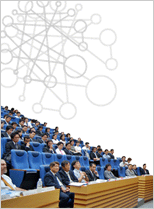WORKSHOP II: PARADIGM SHIFTS IN BIOTECHNOLOGY: DNA, HUMAN CLONING AND BEYOND
The
term “paradigm,” first introduced by Thomas Kuhn in The Structure of
Scientific Revolution, refers to “the theoretical frame or set of
concepts that dominate the opinions and thoughts of people in a
generation.”
From ancient Greece and China to the present,
science has developed with the appearance and disappearance of
paradigms. The discovery of oxygen by Lavoisier, Kepler’s Laws of
Planetary Motion, and Newton’s Laws of Motion are examples of
significant paradigms.
Watson and Crick ushered in a whole new
paradigm in bioscience in the 20th century by discovering the
double-helix structure of DNA. Research in life science, which had been
restricted to observing existing phenomena, was expanded to deeper
aspects of life and life phenomena, and reached a state where
characteristics of living organisms may be altered and new living
organisms created.
Stem cell research, which is receiving
worldwide attention due to Woo Suk Hwang and Shin-Yong Moon’s team’s
successful obtainment of an embryo stem cell using only a somatic cell
and an ovum, and proteomics, which studies proteins and its functions,
are fields of biotechnology that are developing at a rapid rate.
Through these, scientists’ contributions will no longer be limited to
laboratories where research is carried out, but will bring a whole new
paradigm to our lives in general (in a variety of ways, such as by
treating formerly incurable diseases).
These research results
have great influence in society since they deal with life and prompted
many issues in policies and ethics. No matter what solutions are drawn
up and how research directions or scope are established, they must be
in beneficial to peoples’ lives.
This workshop will examine
recent “hot issues,” such as trends in stem cell research and analyze
how these new technologies will affect our lives from political,
economical, social, and ethical viewpoints. We will also predict how
our future will change with developments in biotechnology.
DAY 1 – July 20, 2005 (KAIST campus, Daejeon, Korea)
Session#1 – An Overview on the Past and Present of Biological Science
Modern
biology, which has been rapidly developing since the examination of the
helical structure of DNA by Watson and Crick in the early 20th century,
has recently reached its turning point with the advent of the Human
Genome Project and stem cell research. In this session, remarkable
achievements in biological science and medical science will be
summarized, with the introduction of recent researches and their
applications.
Speaker:
Ilhwan Oh, The Catholic University of Korea
Session#2 – Current Progress and Future Prospects of Stem Cell Research
Recently,
Dr. Woo Suk Hwang and Dr. Shin-Yong Moon have succeeded in the
extraction of stem cells from cloned human embryos. Stem cell research
is rising as a very promising clinical field opening potential answers
to many incurable diseases. In this session, we will discuss the
current progress and the future prospect in stem cell research and its
clinical applications.
Speaker:
Shin-Yong Moon, Seoul National University
Dong Wook Kim, Yonsei University
Session#3 – Stem Cell Research and Religion: From Catholic and Buddhist Points of View
From
the process of obtaining an ovum that is used in research to the scope
of the application of research results, stem cell research raises
profound ethical questions that deal with human rights. As often is the
case in history, ethical questions have been answered by religion,
where fundamental human values have been best approached by. In this
session, two different religious perspectives will be compared to
tentatively address certain universalities of the issue.
Speaker:
Rev. Chang-young Paul Lee, Catholic Bishops’ Conference of Korea
Sung-Chul Kim, Dongguk University
DAY 2 – July 21, 2005 (KAIST campus, Daejeon, Korea)
Session#4 – Stem Cell Research and Bioethics: Where to Draw the Line?
Until
now, medical ethics – often represented as the Hippocrates Oath – has
been the center of bioethics. The rapid development of stem cell
research is challenging this long time status quo. In fact, the actual
realization of human cloning may be witnessed within the next decade.
The consequences of technology abuse will most likely be detrimental in
this case, and therefore, the need for an ethical consensus is
inarguably urgent. What specific points need to be addressed, under
what criteria?
Speaker:
Young-Mo Koo, University of Ulsan College of Medicine
Session#5 – Government’s Role on Biotechnology: Laws & Policies for Regulation
Strict
regulation is particularly necessary in the realm of biological and
medical science for they directly deal with life. This goes beyond the
question of ethics – once a certain line is drawn, the next step would
be reinforcement. In this session, the conditions needed to formulate a
policy on biotechnology will be reviewed, with examples from each
country’s policies. The process of policy making and how this may
affect the research’s direction overall will be discussed as well.
Speaker:
Anne Solomon, Center for Strategic and International Studies
DAY 3 – July 22, 2005 (KAIST campus, Seoul, Korea)
Session#6 – Linking Biotechnology to Industry
Due
to rapid progress in biotechnology, it is certain that numerous
BT-related companies are increasing, but the marketability of this
field is yet to be verified. Does biotechnology have enough
potentiality to become the dominant leader in the market in the future,
following IT? This session presents case studies of companies that are
leading the current field in BT, and the influences they have in the
market. What specific technological trends dominate the bio industry?
Speaker:
Jung-Joo Hwang, Samsung Advanced Institute of Technology
Keith Williams, Proteome Systems Limited
Session #7 – Student Discussion Session: Defining the Basics
The
fundamental grounds for ethical questions in biotechnology involve how
to distinguish between what is life and what is not. The controversy,
the litigations, and the irony all emerge from the same point. The laws
and policies that govern depend on this one question. How can life be
defined? What conditions need to be evaluated, and what characteristics
are sought? A careful follow-through of the logic involved will be
carried out in the form of a mock trial, to arrive at realistic
implications.
Instructor:
Dae-Hwan Koo, Seoul National University
BIOTECHNOLOGY PANELl DISCUSSION SESSION
"The Future Frontiers of Stem Cell Research: Reaching for a Viable Compromise"
Panel Chair:
Kay Kim, Dept. of Chemical & Biomolecular Engineering
Panels:
Anne. G.K.Solomon, Center for Strategic and International Studies
Keith Williams, Proteome Systems Limited
Young-Mo Koo, University of Ulsan College of Medicine
Session#8 – Proteomics: Drug Development and More
After
the completion of the Human Genome Project, efforts are being gathered
to research the nest step. Proteomics is an example. Specific examples
of this field abound, nonetheless, a focus on drug development will be
addressed.
Speaker:
Jun-Ho Jung, Seoul National University.
DAY 4 – July 23, 2005 (KAIST campus, Seoul, Korea)
Session#9 – Student Discussion Session: The Scope of Application of Stem Research
In
this session, we will discuss about the scope of stem cell research,
that is, to where we should restrict the scope of its application. This
session is a cogninued.
Instructor:
Dae-Hwan Koo, Seoul National University
Session#10 – The Media Connection: A Peak on the Future
Today,
mass media plays an important role in every aspect of our lives. In
this last session, we will mainly focus on the relationship between
biotechnology and mass media. What role does the media play in
establishing a general public understanding? Until what point does the
media have the right to interfere? From the media’s perspective, how
does the future look like?
Speaker:
Young-Il Kwon, Korean Science Reporters Association


































